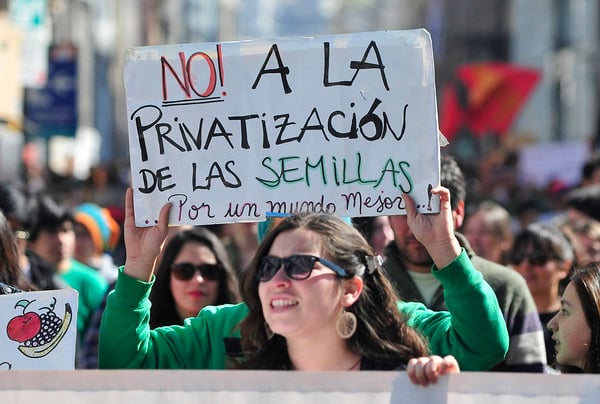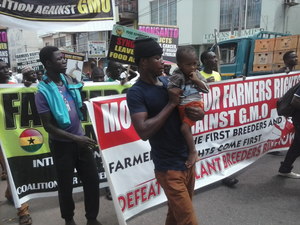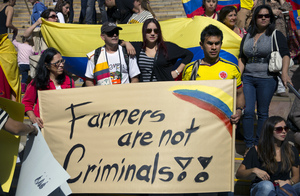What could be more routine than saving seeds from one season to the next? After all, that is how we grow crops on our farms and in our gardens. Yet from Guatemala to Ghana, from Mozambique to Malaysia, this basic practice is being turned into a criminal offence, so that half a dozen large multinational corporations can turn seeds into private property and make money from them.
But people are fighting back and in several countries popular mobilisations are already forcing governments to put seed privatisation plans on hold.
GRAIN has produced an updated dataset on how so-called free trade agreements are privatising seeds across the world.
Guatemala’s trade agreement with the US obliges it to adhere to the UPOV Convention. But popular resistance forced the government to repeal a national law passed for this purpose. (Photo: Raúl Zamora)
Trade agreements have become a tool of choice for governments, working with corporate lobbies, to push new rules to restrict farmers’ rights to work with seeds. Until some years ago, the most important of these was the World Trade Organization’s (WTO) agreement on Trade-Related Aspects of Intellectual Property Rights (TRIPS). Adopted in 1994, TRIPS was, and still is, the first international treaty to establish global standards for “intellectual property” rights over seeds.1 The goal is to ensure that companies like Monsanto or Syngenta, which spend money on plant breeding and genetic engineering, can control what happens to the seeds they produce by preventing farmers from re-using them – in much the same way as Hollywood or Microsoft try to stop people from copying and sharing films or software by putting legal and technological locks on them.
But seeds are not software. The very notion of “patenting life” is hugely contested. For this reason, the WTO agreement was a kind of global compromise between governments. It says that countries may exclude plants and animals (other than micro-organisms) from their patent laws, but they must provide some form of intellectual property protection over plant varieties, without specifying how to do that.
Image right: In Costa Rica, the fight against the Central American Free Trade Agreement was very much a fight to prevent the patenting of the country’s unique wealth of biodiversity and against UPOV – the Union for the Protection of New Plant Varieties. (Photo: Fighting FTAs)
Trade agreements negotiated outside the WTO, especially those initiated by powerful economies of the global North, tend to go much further. They often require signatory countries to patent plants or animals, or to follow the rules of the Geneva-based Union for the Protection of New Plant Varieties (UPOV) that provide patent-like rights over crop varieties. Whether in the form of patent laws or UPOV, these rules generally make it illegal for farmers to save, exchange, sell or modify seeds they save from so-called protected varieties.2 In fact, in 1991 the UPOV convention was modified to give even stronger monopoly powers to agribusiness companies at the expense of small and indigenous farming communities. This 1991 version of UPOV now gets widely promoted through trade deals.
Onslaught of FTAs
The North America Free Trade Agreement – signed by Mexico, Canada and the US, at about the same time TRIPS was being finalised – was one of the first trade deals negotiated outside the multilateral arena to carry with it the tighter seed privatisation noose. It obliged Mexico to join the UPOV club of countries giving exclusive rights to seed companies to stop farmers from recycling and reusing corporate seeds. This set a precedent for all US bilateral trade agreements that followed, while the European Union, the European Free Trade Association and Japan also jumped on the same idea.3
A nonstop process of diplomatic and financial pressure to get countries to privatise seeds “through the back door” (these trade deals are negotiated in secret) has been going on since then. The stakes are high for the seed industry. Globally, just 10 companies control 55% of the commercial seed market.4
But for these corporations, that market share is still not enough. Across Asia, Africa and Latin America, some 70-80% of the seeds farmers use are farm-saved seeds, whether from their own farms or from neighbours or nearby communities. In these unconquered territories, the agribusiness giants want to replace seed saving with seed markets and take control of those markets. To facilitate this, they demand legal protections from governments to create and enforce corporate monopoly rights on seeds. This is where free trade agreements come in as a perfect vehicle to force countries to change their laws.
Latest trends
GRAIN has been tracking how trade deals signed outside the multilateral system are coercing countries to adopt the industry’s wish-list of intellectual property rights for seeds, and ratchet up global standards in that process, since 15 years. A recent update of our dataset shows that this trend is not letting up. In fact, there are worrisome signs on the horizon.
◦ The most important recent gains for Monsanto, Dupont, Limagrain and Syngenta – the world’s top seed companies – have come from new trade deals accepted by Latin American states. In 2006, the US (home to Monsanto and Dupont) closed major deals with Peru and Colombia forcing both countries to adopt UPOV 1991. The EFTA states (home to Syngenta) did the same in 2008 and the EU (home to Limagrain) in 2012.5In Central America, a similar pattern occurred. The US secured a very powerful Central America Free Trade Agreement in 2007, forcing all countries to adhere to UPOV 1991. EFTA did the same last year.
◦ An important step towards stronger proprietary seed markets was recently taken in Africa. After ten years of talks, Economic Partnership Agreements (EPAs) were concluded between the EU and sub-Saharan African states in 2014. Most of them “only” liberalise trade in goods for now, but also contain a commitment to negotiate common intellectual property standards with Brussels. The expectation is that those standards will be based on what the Caribbean states already agreed to in their 2008 EPA: an obligation to at least consider joining UPOV. This is significant because until now African states have been under no obligation to adopt UPOV as a standard, and actually tried to come up with their own systems of plant variety protection.6 And while it’s true that African entities like the anglophone African Regional Intellectual Property Organisation (ARIPO) and the francophone African Intellectual Property Organisation (OAPI) are already joining UPOV, under the EU trade deals, countries themselves would be the ones to join. Further towards the horizon, Africa is harmonising within itself as its subregional trade blocs merge and unite to form a single continental free trade zone, supposedly by 2017. This is expected to bring with it an internal harmonisation of intellectual property laws across the continent, likely tightening the noose even further.
◦ The Trans-Pacific Partnership (TPP) agreement is possibly the scariest FTA under negotiation right now in terms of what it may do to farmers’ rights to control seeds in Asia and the Pacific. This is because the US, which is leading the talks with 11 other Pacific Rim countries, is playing hardball. Leaked negotiating text from May 2014 shows the US calling not only for UPOV 1991 to be applied in all TPP states but also for the outright patenting of plants and animals. We don’t yet know whether these demands will also appear in the Transatlantic Trade and Investment Partnership (TTIP) currently being negotiated between the US and the EU, as the text remains inaccessible to the public.
◦ While the extent of what has to be privatised expands, so do the penalties for disrespecting these norms. Under numerous FTAs, countries like the US require that farmers who infringe on these new intellectual property rights on seeds face punishment under criminal law instead of civil law. In some cases, like the recently concluded EU-Canada Comprehensive Economic and Trade Agreement (CETA), the mere suspicion of infringement could see a farmer’s assets seized or have their bank accounts frozen.7
Big battles heating up
The good news is that social movements are not taking this sitting down. They are becoming very active, vocal, bold and organised about this. In 2013, Colombians from all walks of life were shaken up when they saw firsthand how US and European FTAs could result in their own government violently destroying tonnes of seeds saved by farmers who did not know what the new rules were. The outrage, breaking out in the midst of a massive national agrarian strike, was so strong that the government actually agreed to suspend the law temporarily and re-examine the issue directly with farmers’ representatives.
Source:
http://www.globalresearch.ca/free-trade-agreements-are-criminalising-farmers-seeds-for-the-benefit-of-multinational-corporations/5414731





.jpg)

Post a Comment